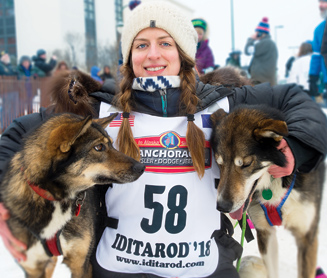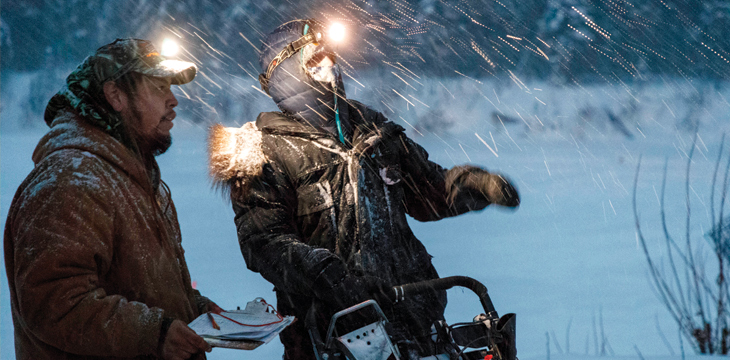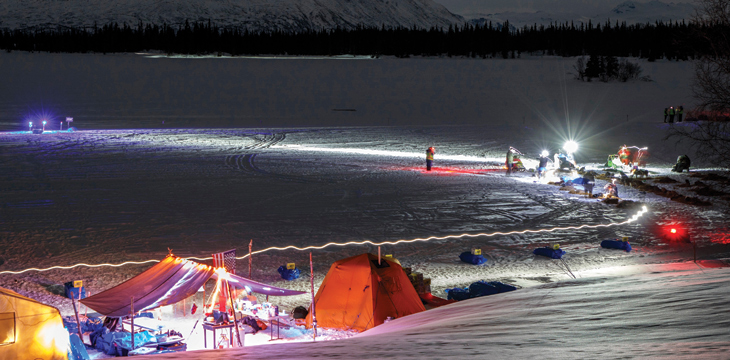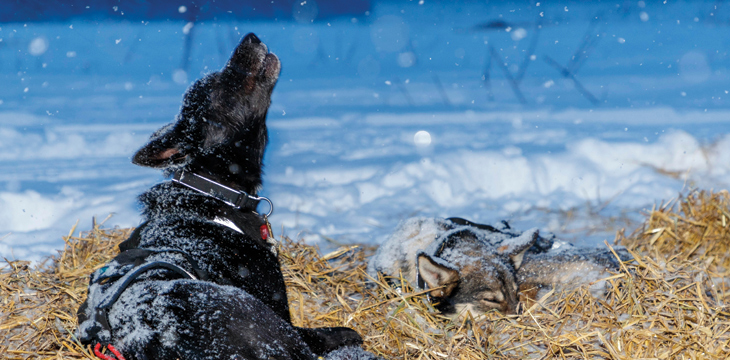The Last Great Race
Emily Maxwell found herself playing the worst game of "Would You Rather" on March 13, 2018, nine days into her first Iditarod.
 PHOTO: ALBERT MARQUEZ/PLANET EARTH ADVENTURES
PHOTO: ALBERT MARQUEZ/PLANET EARTH ADVENTURES
Snow blustered from every direction, causing whiteout conditions and forming drifts over the trail that made it impossible for Maxwell to know if she was still on it. Even the trail markers became invisible, lost in a sea of white or blown over on their sides, succumbing to the rage of the elements.
Maxwell (16BA) and her team of 10 dogs were shuffling along the Alaskan coast, trying to reach the next checkpoint at Shaktoolik. Not a soul was in front or behind them for miles. To their left was the frozen Bering Sea.
Maxwell opened her eyes as wide as she could, trying to see her lead dogs and scan the trail for markers. When she saw one, Maxwell called out to her dogs with a wobbly voice: "Haw, haw. Right there. Good job." But the dogs sensed her uneasiness. Suddenly, the leaders, misreading her cue, flipped around and began pulling the sled down the trail in the opposite direction.
And so on that late afternoon, as Maxwell thought of all the misfortunes she would rather face on the Iditarod Trail than the one she was currently up against, this is what she decided: "I would rather face-plant into a tree than get lost on the Bering Sea."
The best and worst of Mother Nature can be found in Alaska. For every pink-kissed sunset over snow, days of strong storms obscure the path two feet in front of you. For every warm glow of the Northern Lights, temperatures will drop well below zero. And for every smooth slope down into a welcoming village, Alaska has miles and miles of jagged mountains and isolated tundra. Nature goes big here, and whether you're a human or dog competing in the world's Last Great Race, you're up against the good and the bad.
In 2018, 67 mushers and their teams lined up to attempt one of mushing's toughest treks, from Anchorage to the finish line 1,000 miles away under a large burled arch in Nome. Each brave competitor held their own story, their own motives for taking on wind and snow and ice.
As for Maxwell, her Iditarod story begins on the eighth floor of the University of Iowa Hospitals and Clinics. One morning in August 2013, Maxwell and her mom, Mary (73BS), were watching the sun rise through a window. It was quiet, serene even. They could almost forget that anytime now, chaos would intrude—a stream of visits from doctors, nurses, and occupational therapists, as well as the sound of burn patients in pain from receiving their daily baths in the tub room.
Mary looked at her daughter lying in the hospital bed. She couldn't hug Maxwell because of her burns, but she held her hand, and the two took advantage of the quiet to catch their breaths and steel themselves for the day.
And Mary asked herself, "How did this happen?"
Long before Emily Maxwell came to the burn unit at UI Hospitals and Clinics, she was a typical kid growing up in Iowa City. She loved the cold and snow, and she made her mother nervous by climbing a tall tree in their backyard. While a high school student, she entered a triathlon and finished near the top of her age group.
When it came time to pick a college, the UI was a natural choice for Maxwell not only because of its proximity to home, but also because of the reputation of the school's literary program. She studied Spanish and journalism under the tutelage of professors who had written for publications like Rolling Stone. After completing her journalism requirements in 2007, Maxwell continued to feed her sense of adventure. She moved to Spain for a little over a year, where she ran with bulls, and a few years later, while visiting Miami, she went skydiving.
Then, on Aug. 13, 2013, during a slow afternoon in the Iowa City restaurant where Maxwell worked as a waitress, she was walking some dishes to the back. With no slip mats down, the floor was slick, and her feet flew out from under her. The handle of a skillet hung over the walkway, and Maxwell crashed into it on her way down, sending hot oil onto the left side of her face and down her neck, arm, chest, and back.
Maxwell's skin was swollen because of her second- and third-degree burns. Twenty percent of her body was burned, and she spent a few hours every day of her two weeks at the UI Hospitals and Clinics lying naked on a metal table as doctors and nurses scraped off layers of dead skin. Maxwell describes it as the most excruciating pain she's ever experienced in her life. Often, she was surrounded by other patients undergoing the same treatment, and moaning and screams filled the tub room.
Mary, as well as Maxwell's father, Gerry, endured a different kind of pain—the horror of seeing someone they loved suffer. "Your child is in agony, and you have to stand by helplessly," Mary says. "I don't know how Emily had the courage to face what she had to day in and day out—and with a positive attitude. She just had this inner strength and courage at her core."
Maxwell endured a skin graft surgery, nausea-inducing pain medications, and giving up her vegan diet so her body could get the protein needed for recovery. When she left the hospital two weeks later, Maxwell didn't walk out at 100 percent—she still had months of checkups and physical therapy. And the injuries extended beyond the burn itself to other parts of her body and her emotions.
 PHOTO: JEFF SCHULTZ/SCHULTZPHOTO.COM
As heavy
snow falls,
Emily
Maxwell seeks
directions
for parking
her dogsled at
the Nikolai
checkpoint.
PHOTO: JEFF SCHULTZ/SCHULTZPHOTO.COM
As heavy
snow falls,
Emily
Maxwell seeks
directions
for parking
her dogsled at
the Nikolai
checkpoint.
"When you're burned, it's such a traumatic experience and it messes with your physiology," says Maxwell. "A lot of times the victims feel like they go through a mourning process, like somebody has died. I went through the experience, and I thought it was the one thing I could be tough for. I didn't think I would ever be tested that way again."
The accident prompted Maxwell to think about continuing her UI education, and in 2014, she returned to finish her Spanish requirements and enroll in the school's literary translation courses. She completed an independent study with the program's department head, Aron Aji, working on translating Spanish poet Antonio Machado's work. Aji influenced Maxwell both in and outside the classroom, encouraging her natural curiosity.
Maxwell would go on to wrap up her studies in winter 2015, but not before an encounter that would change the course of her life.
When Maxwell walked up to put money in the jukebox at a bar in Girdwood, Alaska, in August 2015, she could feel someone's eyes on her. "But I wasn't looking to meet anyone, so I put the blinders up."
Maxwell and her brother were at the end of a 10-day trip through Alaska, her attempt at distracting herself from the second anniversary of her burn. The scars on her arm, chest, back, and torso were a constant reminder of her past, the scar on her left thigh from skin graft surgery a symbol of what she sacrificed for recovery. She was hoping to use hikes through the wilderness to help heal the remaining emotional scars, and, so far, it was working—the moment Maxwell stepped foot in Alaska, she felt at home.
The eyes that watched her walk to the jukebox belonged to Nicolas Petit, who, unknown to Maxwell, was a well-respected musher. She may have had her blinders up, but later in the evening, the two were matched to play pool. They ended up talking for the rest of the night.
"He was doing tours in Girdwood and invited us to come meet the dogs the next day," Maxwell says. "By the end of the afternoon, it was obvious we were interested in each other."
Maxwell had one semester of school left, but returned to visit Petit over her Thanksgiving break, going mushing for the first time. (She was terrified.) Petit came to visit her in Iowa at New Year's, and the day he left, Maxwell bought her ticket to move to Alaska.
One evening in 2016, as Maxwell began learning to control a dogsled, she and Petit hooked up his dogs around dusk. Maxwell's third run ever was supposed to be a short one. But everything that could go wrong did. The group drove through a few bad water crossings, got tangled in trees, and, according to Maxwell, "the dogs were making love and war." She cried a few times. Maxwell got separated from Petit, wound up in another musher's yard, and was so upset that when a dog handler came out, he thought Maxwell was drunk.
But the more confident she became behind the sled, the more Maxwell began to enjoy the sport. In the 230-mile Denali Doubles, Maxwell and Petit competed as partners with one sled tied behind the other, the perfect race for a rookie like Maxwell. The couple finished second, and she eventually moved on to compete by herself in races like the Knik 200 and Copper Basin 300, which is so tough that mushers say the Iditarod should be a qualifier for it instead of the other way around.
"It's funny when you talk about mushing when you're not doing it," Maxwell says. "You think, 'Why do I sign up for these things?' It's so much work, and you're awake for such long periods of time."
But for Maxwell, a big reason is her dogs.
"In races like these, you feel very connected with them. That bond is one of my favorite things."
With each race she's completed over the last two years, Maxwell has improved at caring for her dog teams, from nailing down the checkpoint routine—removing the dogs' booties and inspecting their feet for soreness, blisters, or swelling; putting down straw to elevate them off the snow; feeding them; and massaging their hips—to recognizing when a dog might need medical attention and have to stay behind for care.
In January's Copper Basin 300, when Maxwell brought more of her dogs to the finish line than last year, she felt more pride in that than in her 11th-place finish.
"I know everybody loves their pet," says Maxwell. "But when you're doing what we do, I can't even begin to explain how zeroed in we are on our dogs' well-being. I've never felt so much like someone's mother. When you're doing a race with these animals, it's not just about you. You're the last thing to be considered, and they understand you put their needs first. The way they look at you is incredible."
 PHOTO: JEFF SCHULTZ/SCHULTZPHOTO.COM
PHOTO: JEFF SCHULTZ/SCHULTZPHOTO.COM
Maxwell served as a dog handler for Petit's team in the weeks leading up to the 2016 and 2017 Iditarod competitions and was a dropped-dog volunteer at a course checkpoint both years. When the time came for her to train for her own Iditarod, Maxwell signed up for every middle-distance race she could, beginning the first weekend in January. That kind of life is not easy—racing every weekend, spending most of the winter on a sled in the cold, putting all your focus on a pack of dogs. But it's something Maxwell takes pride in.
"Not everybody does this," she says. "A lot of people would call it quits because it would be way too hard for them. There's a certain sense of accomplishment with that. Even if you don't place well, getting through some of these races is such a triumph on its own."
They say your ghosts come out on the mushing trail. With long hours on the back of a sled, thoughts of your past rise to the surface and threaten your focus.
But as Maxwell and her dog team were heading the wrong way down the Iditarod Trail earlier this spring, in danger of being lost on the ice of the Bering Sea, she found strength in remembering what came before.
She thought about the fact that two years ago, she wouldn't even go on a run by herself, she was so scared of getting lost or dealing with a dog fight or moose encounter on the trail. She thought of her summers in Girdwood, where she worked 80-hour weeks teaching Pilates at three different studios and waitressing at two different restaurants to cover the cost of mushing.
And Maxwell remembered the people who helped get her to this point. Like Petit (who, at that moment, was on his way to a second-place finish in the race). Even through the two were no longer a couple, he had ignited her love of the sport. And her mother, who held her hand at the hospital, and who, right now, was probably watching her progress on a GPS tracker. People like Scott Janssen, a veteran musher and Maxwell's "Alaskan dad," who helped her reach the safety of a cabin during another whiteout storm earlier in the race.
Maxwell took a deep breath—much like she and her mom used to do as they watched the sunrise from her Iowa City hospital room, much like she did to keep her focus when the pain from her burns felt like it was more than she could handle. But of course, she always handled it. And if Maxwell could handle two weeks in a burn unit, she could get through anything, including this.
Maxwell calmed her voice and called to her one of her lead dogs, Raven: "Gee! Raven, gee!" Her team turned the sled around, and, more relaxed than she was a few moments earlier, Maxwell remembered that her dogs had the ability to feel the trail under their feet, even in freshly fallen snow. She watched them as they weaved, searching for it. And in that moment, she trusted her dogs—and her own ability to get everyone home.
 PHOTO: JEFF SCHULTZ/SCHULTZPHOTO.COM
PHOTO: JEFF SCHULTZ/SCHULTZPHOTO.COM
A sign hangs on the wall at the Iditarod Headquarters in Wasilla that reads, "The Iditarod: A trail of self-discovery across the vastness that is Alaska." Maxwell has had many versions of "self" over the years: A daughter. A triathlete. A UI student. Burn victim. Burn survivor. When she and her dogs pulled into Nome around 5 a.m. on March 16, finishing her first Iditarod in 11 days, 13 hours, and 55 minutes, she had a new identity to add to that list.
"This race is the first time I felt like I could say, 'Yes, I'm a musher,'" Maxwell says. "Even doing races before, I didn't feel like it was totally me yet."
Her 33rd-place finish out of the 52 mushers who completed the race was a strong showing for a rookie who had never been on a dogsled two years ago, for someone who didn't even move to Alaska to become a musher. "But now it's who I am."
Maxwell's path to this new self began long before she even thought of competing in the Iditarod. It began in pain, in a hospital room. But Maxwell found strength in her past, now a moment she can look back on to help her conquer whatever is next, as she remembers to catch her breath and continue down the trail.
